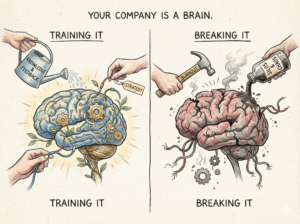Give the Force What It Needs
Summary Insight:
Stop judging people. Start managing energy. If you want higher performance and lower friction, learn to read the force — then give it what it needs.
Key Takeaways:
- Judge the PSIU force, not the person, to see clearly and lead wisely.
- Each force requires a different management style — adapt or stall out.
- Meet the need, move the energy, reduce entropy. That’s real leadership.
If you’ve been following along in the management guide, you know that there are four fundamental forces (PSIU) that shape individual and organizational behavior. You also know that these forces compete for available system energy and that if even one of the forces is absent, the organization will perish. I’ve also mentioned that, if you want your organization to do something new – such as change direction or accelerate performance – you must engage the appropriate force. But how does all this translate into practical steps? And how can you use it to be a better manager of people and situations?
1) Know the Forces at Play
Knowing the forces at play within an individual or an organization delivers fast insight into what otherwise appears as complex or random behavior. For example, if you set up a team with all Producers, then that team is going to demonstrate some predictable behavior and outcomes. It’s going to move very quickly, produce a large volume of work, and blow past its milestones in record time. However, the work is going to have errors (it will be an inch deep and a mile wide), it will totally miss out on the implications and the coordination with other departments, and it will lack creative problem solving. A team of all Unifiers would have very different but equally predictable outcomes.
There’s another important benefit to knowing the forces at play. It’s this: it allows you to see and accept things for what they are, with less judgement. You should not underestimate the power of this. On the one hand, judgment is the capacity to assess situations or circumstances astutely and to draw sound conclusions. Obviously, good judgment is a critical skill for a manager. On the other hand, it’s hard to be a good manager when you’re holding personal judgment against someone or something. That type of interpersonal judgment causes us to close down, stop seeing what’s really there, and miss out on finding creative solutions. It also causes the other person (the person being judged) to feel resentful, unrecognized, and discounted. Like everyone else, I’ve experienced both sides of judgment, as both the judge and the judged. I can unequivocally say that interpersonal judgment demonstrates a lack of personal responsibility and results in a waste of energy and a loss of opportunity.
Growing up, my younger brother Carter and I fought constantly. I was the “responsible” older brother intent on working hard and “making it big” in the world (PsIu). He was the young, carefree spirit who loved to hang out with his friends (psiU). I’m ashamed to say that I would frequently nag, condemn, and ridicule him to get his act together, “be a man,” and make something of himself. The truth is that my vision of him was severely clouded by own judgment and he responded to me as you probably would: “Fuck off. You’re not in charge of me!” Later in college, after a few years of living apart, I took a road trip to visit him in Bozeman, Montana, to go hiking and camping in the mountains. Outdoors in this new environment, and probably because I was out of my own comfort zone, I was able to let go of my “judgment vision” and see my brother in a new light. In fact, I was utterly in awe at what I saw. Here was a young man who was extremely capable, knowledgeable, thoughtful, and powerful. Who was this person? Where did he come from? The fact is that he was there all the time. It was my own judgment that had prevented me from seeing him fully. What a sad loss of time, brotherhood, and missed opportunity!
On the other hand, I’ve also been the judged when my boss couldn’t truly hear, see, or listen to me without his own “judgment vision” clouding the interaction. For example, I had a mentor who is widely-known as a brilliant management thinker, highly regarded and wise. Many rightfully refer to him as the Peter Drucker of his era. I was originally introduced to his work as an entrepreneur and we struck up a collaboration and a friendship. Later, because I was so enamored of his methods, I joined his organization as an associate. However, soon after I joined and he became my “boss” (and not just a friend and mentor), something really altering happened.
He no longer seemed to see, hear, or understand me as clearly as he did before! On the receiving end, it felt like there was a thick interference field now operating between what I spoke and what he heard, between who I was and what he saw. Because I had the experience of collaborating with him deeply before he became my boss, the discrepancy was really profound. Now that I was “inside” the organization, it seemed that I was subjected to the same type of judgment vision I had projected onto my brother. As an employee, my own judgment vision towards him was equally activated. Now, there was no longer an individual and friend, but a “boss” and my own projections of whatever that entailed. All in all, we were two talented, capable people who couldn’t see past their own judgments.
To be clear, I don’t think my example of judgment vision between employee and boss is unique. In fact, I think it’s often the norm. For example, the COO for a famous personal development guru recently approached me seeking help in their strategic growth: “Lex, basically the guru doesn’t listen to anyone inside the company. He really only listens to external experts. We’re stuck on this issue and we need an external expert that he’ll listen to.” We all judge others and ourselves incorrectly. Sometimes consciously, usually not. Judgment of yourself and others may sometimes feel right and good, but it’s really a loss of energy, productivity, and human potential. There is a better way.
Instead of letting your interpersonal judgments run wild, learn to judge the force, not the person. By “judging” or identifying the force, you are able to respond to the underlying energy patterns at work, without becoming caught up in personal criticism. You’ll give yourself and others the freedom to be fully seen, heard, and reach full potential; you’ll have more productivity and less drama in relationships; and the entire organization will have a greater chance to flourish.
Judging a force is pretty straightforward. Rather than labeling a something as good or bad, right or wrong, you simply observe the force in action. Is this individual or situation change-driving or change-responding? Are they dealing with the parts or dealing with the whole? Is it a Producing, Stabilizing, Innovating, or Unifying force or some combination? By judging the force, you are better able to discern behavior without getting caught up in the drama. For example, if I had judged the force within my brother, “Oh, that’s the Unifier force. It likes to be with friends, hang out, and have a good time,” then I’m sure our relationship wouldn’t have been so needlessly draining for both of us. Similarly with my old boss, if I had learned to judge the force rather than the person, I would have been much more effective: “Ahhh, that’s the Innovator/Stabilizer combo. I shouldn’t offer up new ideas in this situation. Instead, I should ask some thoughtful questions to help him reveal his own vision further. And when I do see an opportunity to pursue, I should come prepared with lots of data to support it.”
When we don’t reduce others to the sum of our judgments, not only do we see more clearly but we also allow them to respond to us in a more positive way. We can then enjoy much healthier, more creative, and less energy-draining relationships.
2) Give the Force What It Needs

Good management requires versatility. You don’t manage different people or situations the same way. An effective manager is a flexible one who understands the different focus of each style and gives each one what it needs. Of course, to be truly flexible (and not just wishy-washy) you need to have a strong internal vision and values. You also need to know yourself. Are you a Producer, Stabilizer, Innovator, Unifier, or some combination? And what are your biases? Whatever your style, it impacts how you see the world and interact with others. Good managers recognize their own style and have the ability to adjust it for short periods based on who they are interacting with – all without compromising their own authentic vision and values.
Why is it important to meet the needs of each force? Assuming that you’re dealing with a mature individual, as you give a force what it needs, the energy of that force “moves through” and can make space for the emergence of other forces. But if a force doesn’t have its needs met, the energy stagnates and causes entropy to rise. Put another way, once someone has had their immediate needs met, they are in a much better state to be able to see and appreciate all the other forces and perspectives involved.
Imagine that you’re sitting in your office and different styles of people are coming to you for advice. In the following examples we are going to assume that you are a psiu – that is, you have an equal balance of all four forces. Of course, in real life, no one has a perfect balance so you will have to adjust your temporary style based on your predominant style. Here’s how you might successfully interact with each style by giving each force what it needs.
Polly Producer storms into your office. She has high energy. She’s talking fast and moving quickly. She’s focused on what to do and is frustrated at the continued delays. Your task is to give the force what it needs. So what do you do? You speed up your pace. You take a structured approach. You focus on the most immediate short-term objectives. You help remove any obstacles that are preventing the work from getting done.
Once Polly Producer has had a chance to vent her frustration, she’s once again able to focus on completing the task at hand. In addition, because you’ve met the immediate needs of her strong Producing force, Polly is now able to see things in a new light too. She can have a greater appreciation for all the details (Stabilizing), as well as an improved awareness of other people’s perceptions (Unifying) and the big picture of the overall strategy (Innovating). You can now give Polly lots of autonomy to complete the task. And because she’s a Producer, you don’t have to worry about the work getting done. You only have to check that it’s the right work and she hasn’t gone too far in one direction.
Sam Stabilizer knocks on your door. Sam speaks and moves at a more deliberate, thoughtful pace. He’s focused on how to complete a task or project. He’s in your office because the recent corporate objectives don’t make perfect sense. So what do you do? You slow down your pace. You carve out time to really explain things. You give Sam all the information he needs and all of the raw data involved in the decision. You focus on the short-term practical issues. You help him focus on how to do things more efficiently. You give him plenty of time to analyze all the data.
After Sam Stabilizer’s needs are met, he can amp up is creativity (Innovating) and production power (Producing) and better connect with others (Unifying). But if Sam was never given the data or time to analyze it, he would simply be stuck in his Stabilizing force. There’s no sense in berating Sam to work harder, to be more creative, or to be a better team player until you’ve also given him time to analyze and make sense of the data. By doing this, you’re able to leverage Sam’s talents and will likely uncover aspects of the problem or situation that would remain hidden if he, or someone like him, hadn’t analyzed it.
Isabel Innovator makes a grand appearance. She speaks and moves in broad, fast strokes. She’s been thinking about the new project and has some ideas. “Why not do it this way?” she asks. So what do you do? You amp up your own pace and get excited! You give her the space to go really big picture and take an unstructured, creative approach. Together you explore the broader implications, how to drive better results, and uncover where new innovations lie.
Once Isabel Innovator has had a chance to get excited with someone about her new idea, she may notice that the romance of it starts fading – followed by an increased awareness of the real effort (Producing), details (Stabilizing), and teamwork (Unifying) involved in bringing it to life. The result will be a better, more well-rounded decision. Isabel can now get out of her own way too. She can still be highly creative but won’t be nearly as disruptive by always throwing new ideas into the mix just because they’re new and she wants to be heard.
Ulysses Unifier enters your office and wants to chat. He’s focused on who is doing the work on the new project and is noticing that team morale isn’t has high as it could be. Ulysses moves, speaks, and thinks more deliberately and is usually “happy” and gregarious (unless he’s upset and will then need time to process his feelings). In this case, Ulysses seems really upset. So what do you do? You slow down your pace and try to see the world as Ulysses sees it. You give him space to share his feelings and get his perspective on the needs of the rest of the team. You empathize with him.
After Ulysses Unifier has had a chance to process his feelings, he’s much more capable of doing the work (Producing), following the process (Stabilizing), and supporting the new strategy (Innovating). If he doesn’t get his Unifier needs met, he’s going to be unproductive. Not only that: his gifts as a Unifier, including the ability to uplift others, empathize, intuit, and bring harmony to the team will be lost. By giving the force what it needs, the energy moves through and Ulysses can be at his best once again.
It’s obviously hard work to give a force what it needs. It takes time, energy, skill, and awareness to do it successfully. But if you don’t give a force what it needs, what happens? Our old enemy entropy starts to rear its ugly head. When the needs of a force aren’t met, rather than dissipating, entropy increases and becomes detrimental to the individual and to the team. Polly becomes frustrated to the breaking point. Sam withdraws into quiet resentment. Isabel gets dejected at the lack of interest around her and spins out even more crazy ideas (or stops sharing altogether). Ulysses gets so caught up in the melodrama that he becomes moody, grouchy, and petulant.
So yes, while managing others well is hard and time-consuming work, not managing well has an even greater cost. Doing it right is always worth your time.




